- Home
- P. T. Deutermann
The Edge of Honor Page 9
The Edge of Honor Read online
Page 9
“Is the gun system fully operational, Chief?” asked Brian, his voice taking on a formal note. Vanhorn got the picture.
“Yes, sir. We did op checks and safety checks, and she’s ready to go.”
“Well?”
Vanhorn hesitated, measuring his words. “Well, Mr. Holcomb, after the first twenty or thirty rounds, I can’t guarantee she’ll stay on the line. Them damn things are temperamental. Everybody knows that.”
Brian straightened on his stool. “Well, gents, I’m temperamental myself.
I owned three five-inch fifty-fours on my previous ship as Weps boss, and my guns worked.
Five rounds or fifty. And if we East Coast LANTFLEET pussies can manage it, I expect you grizzled WESTPAC veterans to manage it—in your sleep.
If that son of a bitch stops firing back there, I better see assholes and elbows flying into that gun pit to get her going again.
Understand? And keep in mind, this isn’t San Clemente Island we’re shooting at—these guys shoot back, and if I were them, I’d shoot at the first ship whose gun stops working. Now. Mr. Mccarthy, let’s run through the prefire brief.”
Brian reviewed the prefire in his mind as he watched the formation take shape on the radar scope. The shimmering green outline of the North Vietnamese coast filled the northwestern sector of the radar screen as the bright pip in the center representing Hood merged into the column of three—Hood in the middle, Berkeley astern at one thousand yards, and Hull in the van one thousand yards ahead of Hood, He wondered again whether he had set the gunnery crew up for an accident with his little tirade. The five-inch fifty-fours were notorious for electrical and hydraulic failures. His crew had been only telling the truth about the likelihood of such a failure from lack of regular firing, and he would have to rectify that with the captain once this mission was over. It was also true that the five-inch gun was sometimes capable of doing shock damage to the big air search radars, such as the three-dimensional SPS-48, or the two-dimensional SPS 40. But he was damned if he was going to begin his tour as Weapons officer listening to excuses about the guns or any other Weapons Department system. He looked over at the captain, who was watching the plotting team set up in the surface module. The exec, who had come in from the bridge wearing a flak jacket, steel helmet, and binoculars hanging from his neck, saw Brian looking and gave him a broad wink and a grin, as if to say, Go get ‘em tiger.
“Plot set!” announced It. Gerry Beasely over the intercom. Beasely was the ship’s CIC officer in charge at the naval gunfire support plotting table. “Computer checks SAT. Mount Fifty-one in automatic, rounds loaded to the transfer trays, able-able common set for surface burst at sixty feet.”
“Very well,” responded Brian. He looked over at Beasely, standing in the surface module ten feet away.
Beasely, wearing a sound-powered phone headset, nodded back at him. So far so good. They felt the ship swing into station in the line of ships and steady up on a northeasterly heading. Brian could visualize the gun mount on the fantail, the long gray barrel trained out over the lifelines to the north, rock-steady as the ship rolled gently in the seaway, the train warning bell ringing under the back of the mount to keep people from getting near a firing gun mount.
Not that that’s likely, thought Brian. The ship’s at general quarters.
There better not be anybody walking around on deck.
“Weapons Control, Director One.”
Brian closed his intercom key. “Control.”
“Mount Fifty-one looking good. Stable track in train and elevation.
Pecker’s up about forty degrees.”
“Elevation angle is forty-two degrees, range nineteen thousand, seven hundred yards,” announced Chief Vanhorn from gun plot.
“How’s the solution, Chief?” asked Brian.
“Smooth as a baby’s ass, Control.”
At that moment, the encrypted task unit maneuvering radio circuit in D and D crackled into life with a tone burst.
“Impulse, this is Magnavox. Stand by to commence firing in three-zero seconds. Report if not, I say again, if not ready, over?”
The captain swiveled around to look at Brian, as did Austin and the exec. Brian gave a thumbs-up and the captain turned back around in his chair. Neither of the other two ships came up on the circuit. The exec headed back out onto the bridge, which was his station when the captain was in CIC.
“Control, Director One, I can see Berkeley trained out. I can’t see Hull—she’s in my blind zone.”
“Control, aye.” Brian wished he was topside in the boxy gun director atop the helicopter hangar back aft. In Decatur, he would have been out on the windswept bridge, where he could physically see his guns. He felt uncomfortable and less in control running things from inside the CIC.
His mouth went dry as he wondered how the gun would perform.
“Impulse, this is Magnavox. Commence firing. Commence firing.”
“Batteries released,” declared the captain.
Brian keyed his intercom: “Batteries released, commence firing!”
The gun answered with a muffled, thumping boom, then a dreadful pause that caused Brian to hold his breath, and then a steady progression of boom, thump, boom, thump as the recoil shook the ship along her length.
Brian could hear the dull thuds of the other ships firing between the concussions of Mount Fifty-one interspersed with muffled
“Yeahs!” and
“Go, Mount Fifty-one!” from the other module crews. He keyed the mike again.
“Director One, Control, be alert for any signs of counterbattery.
Remember your procedures.”
“Director One, aye!” Folsom sounded excited, his voice pitching high.
Brian could hear the sounds of the forty-knot wind whistling through Folsom’s mike, and the boom turned into a loud bang in his headset when Folsom keyed his mike. Brian yearned to be outside where he could see.
Suddenly, he heard a commotion as a chorus of groans swept through Combat. At first, he did not understand, then he did. He felt the change in the ship’s motion. Hood was slowing down, her bows beginning to mush into the seas instead of pounding them flat.
“Control, Director One, I can’t see shit! Snipes are making black smoke from number-one stack. Damn!” shouted Folsom, coughing into his mike.
“Get down inside the director and button up, Director One.”
“Director One, aye,” replied Folsom, still coughing.
Mount Fifty-one continued to boom in reassuring cadence.
The captain was bent over the squawk box, talking urgently to the chief engineer down in Main Engineering Control four decks below. Then the radio circuit came up again.
“Tango Four, this is Magnavox. Cease making smoke!
I say again, cease making smoke, over?”
The captain nodded to Austin, who rogered for the order over the maneuvering net.
“Control, Plot, what the fuck’s going on? We’re getting power fluctuations down here.”
“Plot, Director One, Control, hang on, something’s gone wrong in the main spaces. Sounds like a boder problem.”
“Control, Director One, Berkeley’s gonna run up our ass in a minute. Aw shit, now number-two stack’s making smoke. Now I really can’t see, Control!”
Brian’s mind whirled. The ship was losing propulsion power and slowing down in the middle of twenty-seven knot formation, with the tail end destroyer coming up from behind, close enough for her guns to be clearly audible through the CIC bulkheads over the sound of Hood’s own gun. The captain and the Ops officer were both shouting at once, and then came the dreaded sound of a general electrical power failure, with all the lights going dim and then out and the vent fans on the consoles winding down in a pathetic spiral of diminishing sound.
Mount Fifty-one stopped firing as the weapons control systems lost electrical power, and everyone in CIC seemed to be shouting at the same time to turn off equipment. He saw Gerry Beasely take off his headset
and throw it down on the deck plates cursing furiously.
Brian reached down and switched his intercom set from the electrical intercom to the sound-powered control circuit.
“Director One, Control.”
Silence. The snouting of orders in CIC got louder and then diminished.
Without power, the sixty men in Combat were next to useless.
“Director One, Control!”
“Control, this is Plot. We’re up on the JC and JP circuits. I’ll get him for you.”
“Control, this is Director One on JC.”
“Yeah, Jack, okay. What’s happening out there?”
Brian felt Hood beginning to wallow from side to side as she lost speed.
The sound of another ship’s five-inchers was much louder now, a steady double blam sound clearly audible throughout the CIC.
“Control, Director One, Berkeley’s hauled out and coming by on our port side, still firing. I can’t see a fucking thing astern but black smoke—we must look like we’re on fire or something. It looks like a refinery fire behind us.”
Brian thought fast, reviewing procedures for a power failure. He knew the ship’s emergency generators would be lighting off in a moment.
“All stations, Control, it looks like the snipes lost the load, both ends, and we’re going DIW. Strip down all power loads so we don’t overload the emergency diesels.
Plot, we got a hot gun back there? Gimme a bore report.”
“Plot, aye, yes, sir, we technically have a hot gun— fifty-six rounds in less than two minutes. Hang on.”
There was a long moment of silence, then the chief’s voice returned.
“Mount reports bore’s clear, so no problem.”
Brian acknowledged and reported the bore clear to the captain, who gave him a distracted thumbs-up acknowledgment as he listened to the chief engineer on the squawk box. Benedetti’s voice rose hysterically out of the box from Main Control. He was almost drowned out by the sounds of engineers yelling and the sound of steam or compressed air escaping in the background.
Brian took a deep breath and wiped his face with his hand. With the air-conditioning systems gone, the temperature in Combat was already rising. Fifty-six rounds. Not too shabby, as they said out here in the Seventh Fleet. But also not 150. He wondered fleetingly whether the power failure had saved him from the embarrassment of a gun failure.
We’ll never know, said a voice in his head. He felt relieved and guilty simultaneously.
The CIC watch standers were grabbing for loose gear as the ship began to roll more heavily. The only fight came from battery-operated battle lanterns positioned around the bulkheads. Console operators were fastening their seat belts and talking quietly. The sounds of Berkeley’s guns moved forward and away from them as she raced past outside at twenty-seven knots, rocking Hood with her wake moments later. With CIC hot, dark, and blind, the captain left D and D to go out to the bridge.
Brian was wiping his mouth with the back of his hand when he heard a rapid-fire thump-thump from somewhere aft. Every man in CIC heard it at the same time. Not a one of them had ever heard that sound before and yet every man knew instantly what it was.
“Whoa, Control, Plot this is Director One! Counterbattery!
Counterbattery!” shrilled Ensign Folsom over the sound-powered phones.
“Port side, astern of us, three hundred yards! Right on the edge of the smoke.”
Having been a gunnery officer, Brian knew the drill: Direct Plot to switch control of the gun mount to the director officer. The mount would be slaved electrically to the director’s movements, so when the director officer pointed his optics at the gun flashes on the beach, assuming he could see where the shooter was, the gun’s barrel would be pointed where the optics were looking. He was keying down his mike when he remembered that, without power, none of this would work. The ship was helpless, unable to shoot back until power was restored.
“Well, you might as well sit back and enjoy it, Director One. Ain’t shit we can do about it now,” drawled Chief Vanhorn from down in Plot.
“We need to turn this hog around and get back in our own smoke screen,”
shouted Folsom.
“COUNTERS ATTERY, COUNTERS ATTERY,” announced the 1MC, as if no one knew that the ship was under fire. “ALL HANDS TOPSIDE. TAKE COVER, ON THE DOUBLE!”
The voice on the 1MC sounded to Brian like that of the exec. He doubted anyone topside needed to be told to take cover. Hood was really beginning to roll now. With almost no “way” on the ship, she was turning across the wind and the seas. Brian felt utterly useless, but technically he could not leave his station. He could no longer hear the other destroyers’ guns. The noise level in Combat was down to next to nothing; the men looked anxiously at one another and waited to see what would happen next. Brian knew that the ship had two emergency generators, but from the sound of things down in Main Control, it did not appear likely that the engineers had things sorted out yet. His thoughts were interrupted by a sound like a giant sheet of canvas being ripped in two above the ship, followed by two more thumps that were clearly a lot closer than the first two.
“Control, Director One, those were pretty fucking close!”
“At least they’re going off in the water, Director One,” said the calm voice of the chief. “They go to frag, you sightseers are in for some interesting shit.”
“Easy for you to say, Chief. You’re below the waterline.”
Brian broke in. “Keep your head down, Jack. I’m sure the snipes are busting their asses to get some steam up. They can hear those things in the main holes, too, you know.”
“Director One, aye.”
Across the room in D and D, Austin was conferring anxiously on a sound-powered phone with the computer r center one deck below as the electronics technicians assessed the damage from the power drop. The ship’s complex radars and computers were very sensitive to power fluctuations. A clean power drop usually did little damage, but a lingering voltage ramp-down like this one often burned out vital electronic components. Brian 4 wedged himself in between the engagement controller and the fire control systems coordinator consoles to keep upright as the ship rolled deeply. They must be almost dead in the water. The two chiefs sitting the consoles [ looked up at him and shook their heads.
“Fucking snipes,” growled Chief Iverson, the senior missiles radar chief. He was worried about his SPS-48 radar. If the 48 had been damaged, their whole PIRAZ capability was endangered.
The sound of ripping canvas came again and everyone tensed, trying to shrink into their seats without anyone seeing. There was a second of deathly silence, followed by a single thump. As everyone began to exhale, there was a loud bang from the port side, followed by a very loud rattle of what sounded like hail all along the port [ side bulkheads of CIC. A fluorescent light fixture exploded in a dusty popping noise over the aisle leading to the ASW module, and a radarman third class named Festerman, standing by the tracking table, grabbed his left hand.
“Fuck me!” he howled, staring at his hand as blood welled up through his fingers and dripped all over the dead-reckoning tracer table. Several men got up at once to help Festerman, who continued to stand there in shock, staring at his bloody hand.
“Director One, you catch any of that?” Brian asked.
His throat clenched as he realized that the enemy’s shrapnel had penetrated the CIC.
“Looks like we finally got the paint chipped out on the director, Control, but we’re all okay. You should see the spray pattern that one made. This isn’t little stuff they’re shooting.”
The surface module team quickly bandaged up the radarman’s hand as Austin, his face pale, reported one injury in CIC and possible equipment damage from shrapnel. The ship was rolling steadily now, making it difficult to stand up. Brian felt like the proverbial fish in a barrel, standing in a darkened and useless CIC while the bad guys fired heavy artillery at them. He decided to go to the bridge. He passed over the headset to Chief Iverson
.
“I’m going out to the bridge, Chief. You have control.”
“Aye, sir. Keep your head down.”
Brian opened the front door to CIC, stepped into the small vestibule by the navigator’s chart room, and then stepped through another door out into a blaze of morning sunlight. He blinked against the glare and saw the captain and the exec standing over on the port bridge wing, binoculars to their faces, the captain now wearing his steel helmet and flak jacket. The lookouts were clustered in the pilothouse with the rest of the bridge team, with everyone trying to stand on the starboard side without seeming to do so. About a mile off the port bow, he could see that both Berkeley and Hull were turning around.
They were steaming across the glinting gray sea in a loose column at high speed, pointed to pass between Hood and the shooters on the beach.
Both ships were streaming copious amounts of black smoke from their stacks. As he watched, Berkeley swung her forward gun mount to face the shore and opened a brisk fire. Hull joined her a moment later with two guns.
Brian started over to join the captain and the exec on the bridge wing, when the tearing sound of two more incoming shells stopped him in his tracks. This time, he got to watch as one burst underwater off the port bow, creating a bright green ribbon of bubbles underwater before punching up a dirty spout of water and smoke eighty feet into the air.
He was looking for the second splash when a giant swung a hammer down on the pilothouse roof with an earsplitting clang, followed seconds later by another waterspout burst one hundred yards off the ship’s starboard side. Light bulbs, acoustic tiles, a radio speaker, and a cloud of dust rained out of the overhead while the men on the bridge team grabbed their helmets against flying debris. Brian, still standing in the doorway, realized that the shell had ricocheted off the deck of the signal bridge above before whining off to the starboard side. He found himself, covered in dust and paint chips, staring at the captain and the exec through a cloud of cordite smoke blowing back across the pilothouse from the blast to starboard. The captain said something to the exec and then hurried across the pilothouse to his chair, where he mashed down the squawk box key and called the engineers. The debris littering the deck of the pilothouse began to slither around as the ship rolled again.

 The Nugget
The Nugget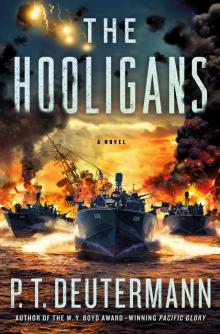 The Hooligans
The Hooligans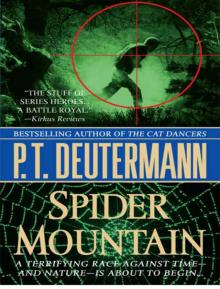 SPIDER MOUNTAIN
SPIDER MOUNTAIN![Cold Frame [retail] Read online](http://i1.bookreadfree.com/i/03/19/cold_frame_retail_preview.jpg) Cold Frame [retail]
Cold Frame [retail] Sweepers
Sweepers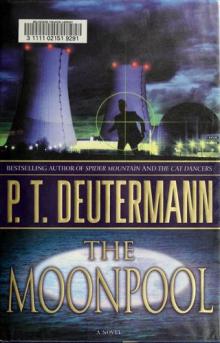 Cam - 03 - The Moonpool
Cam - 03 - The Moonpool Trial by Fire
Trial by Fire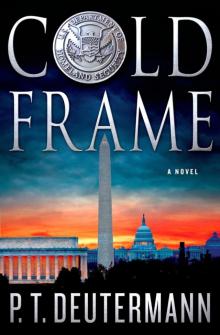 Cold Frame
Cold Frame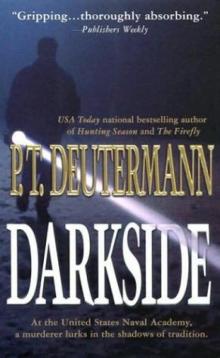 Darkside
Darkside Cam - 04 - Nightwalkers
Cam - 04 - Nightwalkers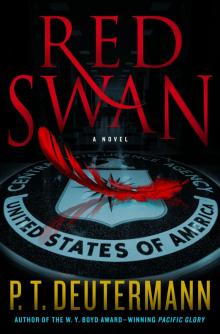 Red Swan
Red Swan The Commodore
The Commodore Hunting Season
Hunting Season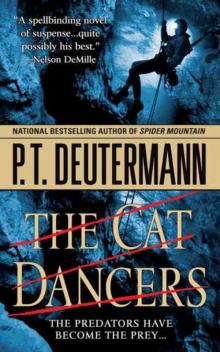 The Cat Dancers
The Cat Dancers Scorpion in the Sea
Scorpion in the Sea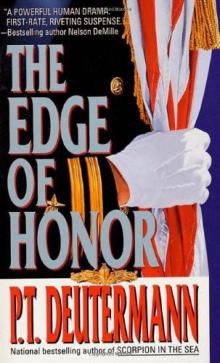 The Edge of Honor
The Edge of Honor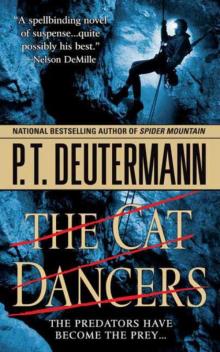 The Cat Dancers cr-1
The Cat Dancers cr-1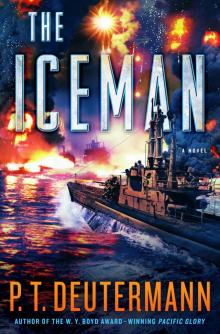 The Iceman
The Iceman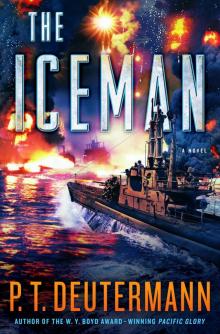 The Iceman_A Novel
The Iceman_A Novel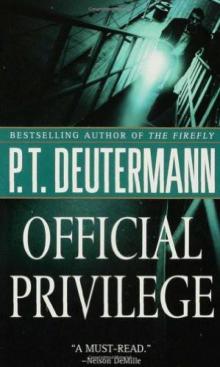 Official Privilege
Official Privilege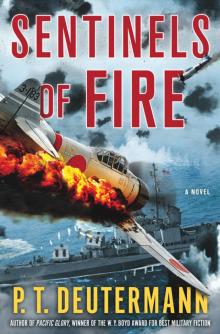 Sentinels of Fire
Sentinels of Fire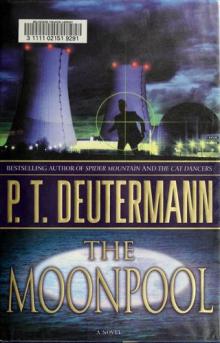 The Moonpool cr-3
The Moonpool cr-3 Nightwalkers cr-4
Nightwalkers cr-4 The Firefly
The Firefly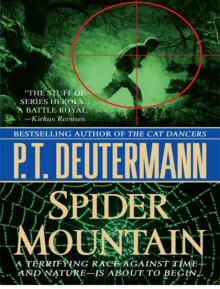 Spider mountain cr-2
Spider mountain cr-2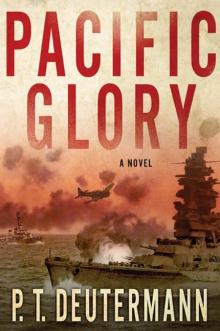 Pacific Glory
Pacific Glory The Last Man
The Last Man